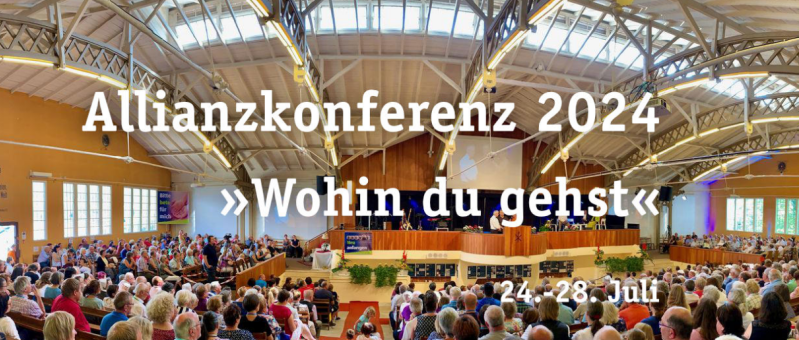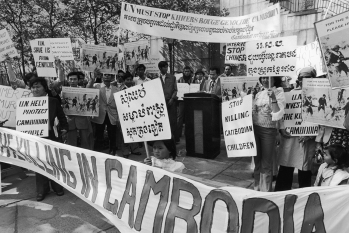
“It’s a tradition for some people because they can be inspired there,” Heinrich, a Salvation Army pastor by calling, told Christian Daily International. He is co-leader of Evangelische Allianz Deutschland [EAD – the German Evangelical Alliance], which organizes the conference, alongside his brother-in-Christ, Dr. Reinhard Schink.
The 128th Allianzkonferenz (Alliance Conference) organized by EAD for all ages kicked off yesterday at the conference hall in the town of Bad Blankenburg, Thuringia. Entry is free, with goodwill donations accepted.“It is not a typical conference, like on leadership or church growth or something like that, it is for fellowship,” said Heinrich. “We want to show that we are united in our main core, and that is the word of God, and in the fellowship and community of Christians.”
Heinrich referred to the five pillars of the evangelical alliance movement: prayer, the importance of the Bible, unity, evangelism and speaking into the world, adding that the culture of the Alliance conference was celebrating these five elements.
For many attendees, the event is the highlight of their summer, or even year, according to Heinrich.
“They like to have something more than their church, and something different and it’s a bit of a holiday week but digging deep into the Bible and there’s fellowship. It’s about hanging out together, encouraging Christians in their lifestyle and giving them the inner provision that they are not alone.”
A regular Bible study happens throughout the days of the conference complemented by music including the musical ‘Das Wagnis’ by Gilbrecht and Marion Schäl, with 100 actors poignantly retelling the stories of the first Christian martyrs in Rome.A performance by songwriter Manfred Siebald is also planned, and the world of sport will be represented with appearances by Marco Hösel (trail world champion) and the Olympian Kordula Striepke, as well as 40 seminars and workshops, and activities for youths on the agenda.There’s also a children’s sports arena (KISA) with a kids program in six different sporting activities.
The conference alternates Bible study themes each year between the Old and New Testaments – this time it is the book of Ruth on the theme “where you go,” but next year it will be Colossians.
“Each year we pick a book of the Bible and go to it, and ask teachers from all kinds of backgrounds to give us a talk, to give a deeper understanding and application,” explained Heinrich.
The conference will see 15 main speakers, mostly from Germany, giving insights. Heinrich underscores the wide scope of the event, with participants coming not just from Germany but also, in previous years, places as diverse as South America, Switzerland, the Netherlands, Ukraine and Russia.
The Alliance Conference has been held most years in Bad Blankenburg; originally founded as a Bible and faith event in 1886 by writer Anna von Weling.
“This is the soul homebase for the evangelical alliance in Germany,” mused Heinrich, recalling how the local mayor, in yesteryear, gave permission for the conference as long as participants helped gather crops for the town’s harvest.
The exact number of conference attendees is hard to pinpoint. During the Covid pandemic, the event didn’t happen apart from an online presence but it returned in recent years. The free entry means there is no monitoring of numbers but Heinrich estimated between 1,000 to 1,500 people would attend.
“People could even come just for a day, then drive home for the night and then return the next day.”
This relaxed perspective by the organizers helps attendees to feel welcome. Heinrich pointed out it was not “a leaders conference” for church ministers but an open event for regular churchgoers.
“In Germany, the principle of the EA is to involve not just leaders of churches but members of churches, more of a grass roots idea. We don’t have a leadership conference but instead call it a Bible conference where we enjoy time together.”
There is a serious need for the heritage of encouragement embedded in the conference to revitalize attendees, he says, as evangelical Christianity faces various societal-cultural challenges in western Europe, which includes Germany.
For Heinrich, the challenge is spiritually reacting well to these developments in the outside world, such as the war in Ukraine. “I see the challenge as being, how do we react to the threats from the outside world? I don’t know the answer but for such a long period of time there has been no war, and now there are war sounds going on and there is an initial reaction in our hearts and many are worried.”
Another challenge for evangelicals are divisions in society, which can seep into families and churches. “How do we react?” asked Heinrich. “Do we go the same way as those around us in judging people with generalized judgments? The challenge of the situation is how to see clearly with open eyes, to see the need in the world and not just be judgemental. To translate the main lines of the New Testament, the verses in Peter: to be grateful at all times, and to look at what’s good and precious, this should be your focus. That is a major struggle in Germany.”
Heinrich was inspired by countries with high levels of persecution against Christians, which nonetheless record high rates of successful evangelism and church growth. “They know how to pray and to keep their hearts lively.”
Evangelical churches in Germany have not grown in recent years, according to Heinrich, although there has been a burgeoning in Orthodox believers as a result of refugees from Ukraine, Russia, Romania and other countries.
“That’s to do with movement in Europe and the Orthodox believers have grown from one million to three million in the last five years or so,” said Heinrich, adding that numbers in the Lutheran churches, which can overlap into evangelical circles, and also Catholics, have dropped in numbers.
“Having said that, I don’t believe the numbers tell the truth that it’s not the faith that has decreased, it’s just that they quit [the churches], but not the faith.”
The event sessions are live streamed on YouTube.





